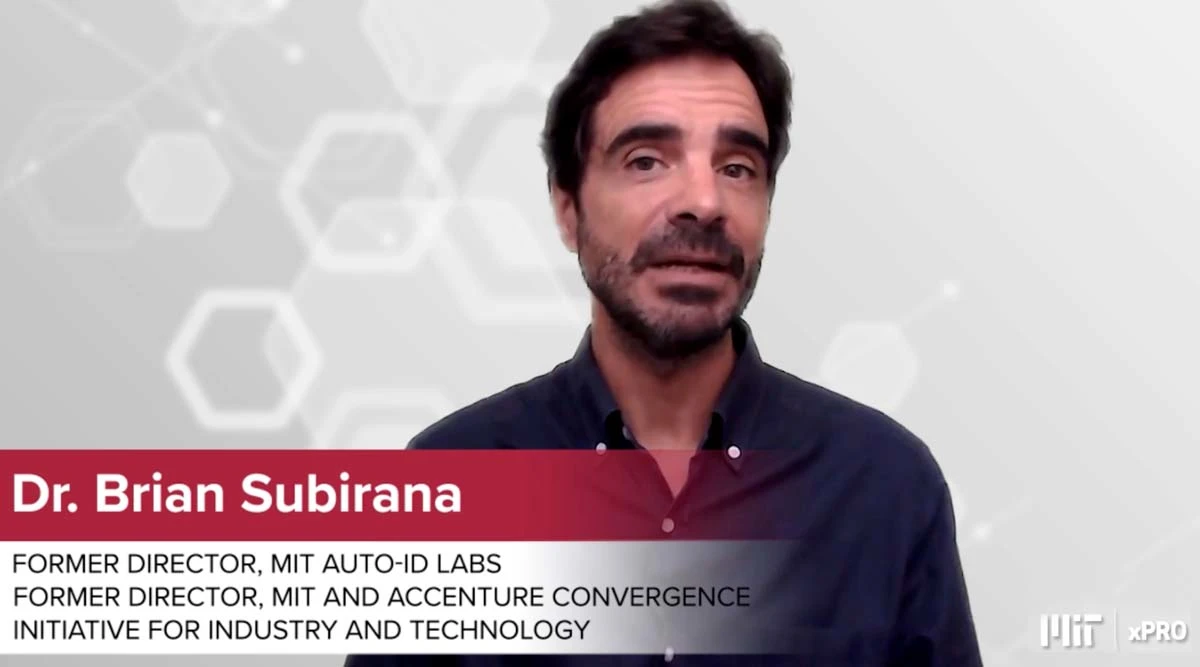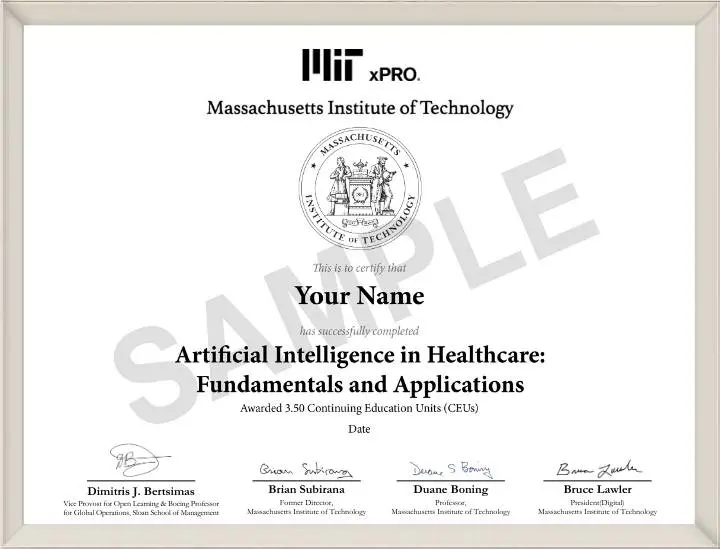Artificial Intelligence in Healthcare: Fundamentals and Applications
Harness the power of artificial intelligence (AI) to elevate modern-day medical treatments
Solutions for the Future of Healthcare With AI
AI plays an increasingly important role in patient treatment. With its ability to accurately predict diseases at early stages, AI is regarded as a powerful tool in today’s healthcare industry.
Since AI offers benefits such as informed patient care, improved patient safety, and innovative treatment options, it isn’t surprising that 56% of clinicians believe that most of their decisions over the next decade will be made using AI-based clinical decision support tools. However, clinicians face a knowledge gap and report the rising need for professionals who understand AI-based technologies and ways of leveraging them for the advantage of healthcare providers and patients.
With a focus on the application of AI in modern-day healthcare, MIT xPRO’s AI in Healthcare: Fundamentals and Applications program is designed to give clinical leaders, healthcare IT professionals, and healthcare entrepreneurs the opportunity to learn how AI technologies can make a difference in patient treatment and enable them to develop innovative solutions to the healthcare challenges of today and tomorrow.
Note: The content of this program assumes previous knowledge of calculus, linear algebra, statistics, and probability. Basic Python experience will also be beneficial.
Watch the Progam Preview
Watch the video to learn how this program can help advance your career in healthcare.

Who Is This Program For?
A basic understanding of artificial AI, machine learning, data science, and AI in healthcare is ideal in order to make the most of this program.
Technical professionals in the healthcare industry: Technical professionals, such as technical product managers, product managers, directors of product, product design managers, engineering managers, technology project managers, directors of engineering, and directors of technology, who are looking to drive the adoption of AI technology in healthcare at their organizations by adding AI products and services to their arsenals so as to empower patient care
Entrepreneurs: Leaders in their organizations’ foray into AI technology in healthcare who are searching for the right AI solutions to impact millions of lives
Clinical leaders: Senior physicians, department chairs, medical directors, chief medical officers, physician service line directors, nurse leaders, hospital administrators, directors of clinical services, and nursing/medical school deans seeking to sharpen their understanding of AI products and methodologies to advance patient care and identify new opportunities emerging from the field
Tech consultants in healthcare: Consultants in hospitals, digital health, pharma, med tech, research, and insurance who are responsible for shaping the AI strategies for organizations and are, therefore, looking to upgrade their knowledge about new technologies, thereby changing the healthcare system
Program Highlights

Learn real-world application of ai in healthcare simulation by creating an AI decision framework relevant to healthcare

Gain an understanding of concepts and technologies, such as machine learning, deep learning, neural network NLP, and biomechatronics

Acquire insights and examples from expert MIT xPRO faculty

Develop your ability to assess challenges, opportunities, and future-driven patient care solutions involving a variety of AI technologies

Earn a certificate and four continuing education units (CEUs) from MIT xPRO
Key Takeaways
This program is designed to equip you with the skills to broaden your understanding of the applications of AI technology in healthcare. The program will help you to:
Build a Foundation
Learn about the AI design process model through its various stages
Understand different machine learning algorithms and how they can be applied in varying scenarios
Examine neural network NLP algorithms and their widespread application
Discover the possibilities and limitations of biomechatronics
Apply Your Skills
Use the four stages of the AI design process model to solve a technical healthcare problem
Run an implementation of a single- and multilayer perceptron in Python
Develop an idea for an ingestible robot to solve a healthcare problem
Use the peloton framework, designed by research scientist Brian Subirana, within your specific healthcare domain
Execute
Assess business and technical requirements for AI
Map the AI design process and arrive at a cost model
Resolve a communication problem while using prosthetics
Develop an AI product or service for healthcare
Assignments and Projects

Ideating an ingestible robot
Resolving a communication problem when using prosthetics

Business and technical requirements for AI
AI cancers

Hypothesizing an AI product for healthcare
Testimonials
Program Topics
Case Studies and Research
Through this research, identify how to generate realistic-looking images of the heart that can be instrumental for cardiologists in diagnosis and treatment.
From this research, you learn about “GENCODE — the” attempt at creating an encyclopedia of genes and genetic variants.
This research contains a useful tool for antibiotic discovery that can aid you in your own drug discovery.
Through this research, learn how to use an image-based, deep learning model that can predict breast cancer up to five years in advance.
From this research, you learn how to create bionic limbs that emulate the function of natural limbs.
From this case study, you learn how the instrument named Emerald functions. It measures sleep stages, gait speed and mobility, human pose estimation, and adherence.
From this research, learn how Bruce Lawler makes great strides in his goal to find the shortest path from data to impact.
Faculty

Managing Director, MIT Machine Intelligence for Manufacturing and Operations (MIMO)
Bruce Lawler is a technology entrepreneur and an executive leader. He has developed several applications across platforms, such as mobile, SaaS, AI, and video distribution net...

Former Director of MIT Auto-ID lab, MIT
Brian Subirana has taught at MIT Sloan and the MIT School of Engineering and he is also on the faculty of Harvard University. His research centers on IoT and AI and focuses on...

Clarence J. Lebel Professor, Electrical Engineering and Computer Science
Duane Boning is affiliated with the MIT Microsystems Technology Laboratories and serves as associate director of machine learning and statistical methods for modeling and cont...

Certificate
Upon successful completion of this program, MIT xPRO grants a certificate of completion to participants as well as 3.50 CEUs. This program is graded as a pass or fail; participants must receive 75% to pass and obtain the certificate of completion.
After the successful completion of the program, your verified digital certificate will be emailed to you, at no additional cost, in the name you used when registering for the program. All certificate images are for illustrative purposes only and may be subject to change at the discretion of MIT xPRO.
FAQs
Didn't find what you were looking for? Write to us at learner.success@emeritus.org or schedule a call with one of our Program Advisors or call us at +1 401 443 9591 (US) / + 44 189 236 2347 (UK) / +65 3129 7174 (SG).
Early Registrations Are Encouraged. Seats Fill Up Quickly!
Flexible payment options available.
Starts On
